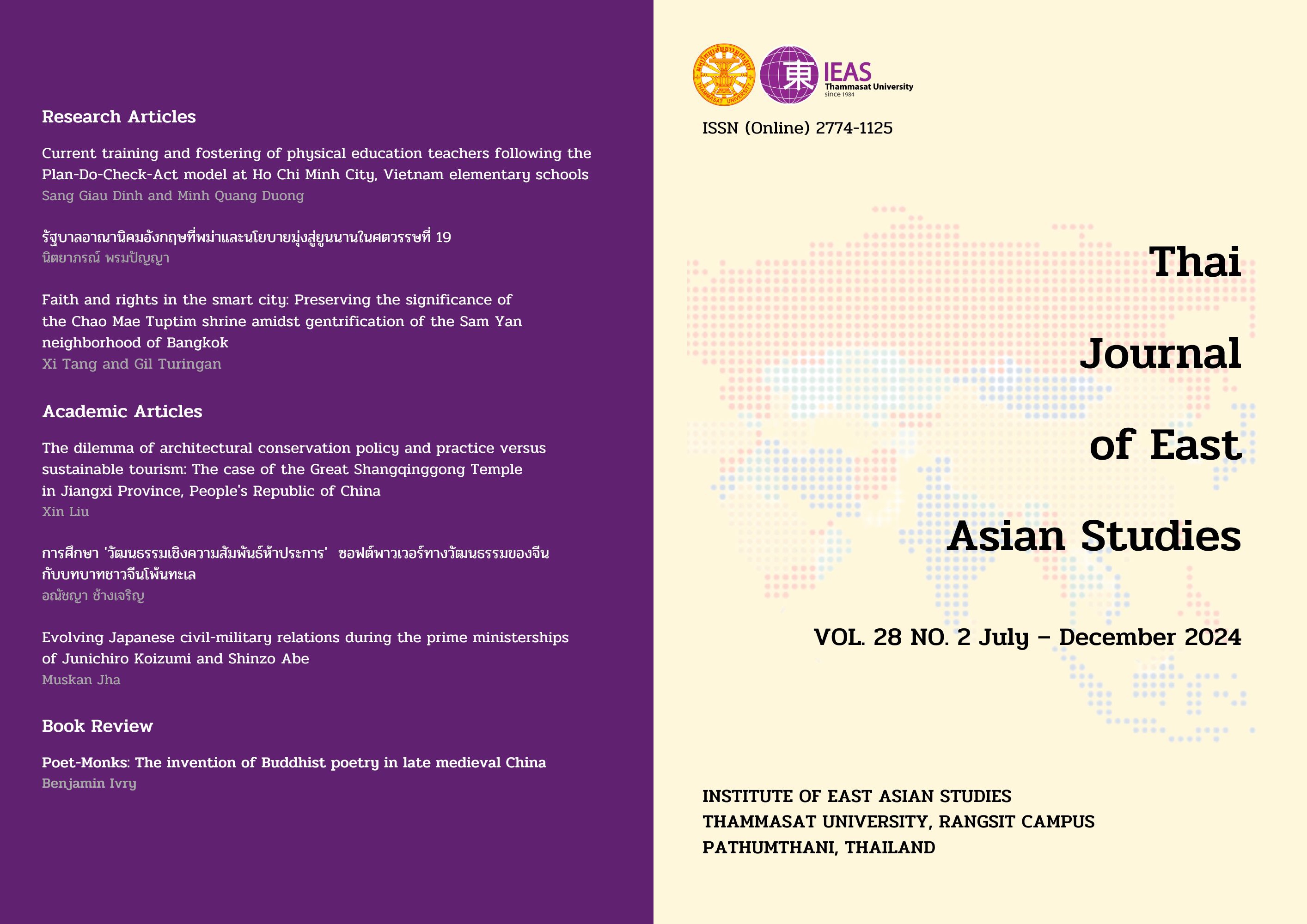Current training and fostering of physical education teachers following the plan-do-check-act model at Ho Chi Minh City, Vietnam elementary schools
คำสำคัญ:
physical education, physical education teachers, human resources development, Plan-Do-Check-Act (PDCA) modelบทคัดย่อ
This article explored the current status of physical education teacher (PET) team development in Ho Chi Minh City, Vietnam elementary schools. Awareness of the meaning and significance of developing a PET team; and the current status of training and fostering PETs according to the Plan-Do-Check-Act (PDCA) model were also examined. Data was collected by questionnaire from 522 managers and teachers and by interviews with 30 Ho Chi Minh City elementary school managers and teachers. Results were that PET team development was strongly influenced by internal and external factors, including educational innovation, policy mechanisms, school culture, human issues, cognition, managerial capacity, and teacher individualities. The most significant managerial issue was to control negativity and promote positivity. Simultaneously, managers must constantly improve PET training and fostering to ensure development of sufficient high quality instructors meeting international standards.
Downloads
เอกสารอ้างอิง
Beardwell, I., Holden, L., & Claydon, T. (2004), Human Resource Management – a Contemporary Approach (latest edition). Prentice Hall.
Boiser, L. (2021, April 14). The PDCA Cycle: What is it and Why You Should Use it. Kanban Zone. https://kanbanzone.com/2021/what-is-pdca-cycle/
Darling-Hammond, L., Hyler, M. E., & Gardner, M. (2017). Effective Teacher Professional Development. Learning Policy Institute.
Desler, G. (2013). Human Resource Management (13th ed.). Pearson.
Huan, C. W., & Nasri, N. B. M. (2022). Teacher Teaching Practices Based on the PDCA Model: A Systematic Literature Review. International Journal of Academic Research in Progressive Education and Development, 11(3), 542–553.
Kumar, A. (2018). The importance of physical education in today’s schools. International Journal of Yoga, Physiotherapy and Physical Education, 3(1), 77-78.
Li, Y., Li, X., & Li, J. (2014). Exploring the underlying mechanism of PDCA cycle to improve teaching quality: A motivation theory perspective. In D. F. Kocaoglu (Ed.), Proceedings of PICMET’ 14 Conference: Portland International Center for Management of Engineering and Technology; Infrastructure and Service Integration (pp. 2693-2698). Kanazawa, Japan.
Luo, L., & Kim, W.V.E. (2023). Analysis of the Factors Influencing the Quality of Logistics Talent Training in Vocational College in Zhejiang Province, with the application of PDCA Quality Management Theory in the Theoretical. International Journal of Management, Accounting, Governance and Education, 3(2), 236–248. https://ojs.unirazak.edu.my/index.php/image/article/view/81
Loc, N. (2010). Training high-quality teachers in the present era. VNU Journal of Science: Social Sciences and Humanities, 26(1), 46-52. https://js.vnu.edu.vn/SSH/article/view/1830
Madsen, K. A., Hicks, K., & Thompson, H. (2011). Physical activity and positive youth development: Impact of a school-based program. Journal of School Health, 81(8), 462-470.
Mello, J. A. (2015). Strategic Human Resource Management (3rd ed.). Cengage Learning.
Minh, T. K. (2022). Proposing some methods to develop physical strength for students of Xuan Dinh Secondary School Bac Tu Liem District, Ha Noi City. Lam Dong Library Digital Collection. https://hupes.edu.vn/upload/files/53-57.pdf
Ministry of Education and Training. (2018). Circular 32/2018/TT-BGDDT promulgating the new general education program. https://hoatieu.vn/phap-luat/thong-tu-32-2018-tt-bgddt-161465
Ministry of Education and Training. (2019). Resolution No. 29-NQ/TW. The 8th Central Conference, session XI on fundamental and comprehensive innovation of education and training. https://lawnet.vn/en/vb/Resolution-No-29-NQ-TW-fundamental-and-comprehensive-innovation-in-education-35932.html
Morgan, K., & Hansen, V. (2008). Recommendations to enhance the transfer of training. Journal of Physical Education, Recreation & Dance, 79(6), 29-34.
Prime Minister (2016), Decision 1076/QD-TTg, dated June 17, 2016, Approving the project on the development of physical education and school sports for the period 2016-2020, with orientation to 2025.
Sandra, C. D. (2016). The position of Physical Education within the primary school curriculum: perceptions, attitudes and realities [Doctoral dissertation, University of Wollongong, Australia]. University of Wollongong Thesis Collections. https://hdl.handle.net/10779/uow.27662409.v1
Sokovic, M., Pavletic, D., & Pipan, K. K. (2010). Quality Improvement Methodologies - PDCA Cycle, RADAR Matrix, DMAIC and DFSS. Journal of Achievements of Materials and Manufacturing Engineering, 43(1), 476-483.
Yaakop, N., Koh, D., & Yasin, R. (2023). Global Trends of the Teacher Knowledge of Physical Education: A Bibliometric Analysis. Retos, 49, 174-188. https://doi.org/10.47197/retos.v49.97291
Sun, Y., Qu, H., & Niu, X. (2022). Application effect of PDCA cycle combined with hybrid teaching mode in endocrinology inters teaching and its influence on students’ concentration in learning. Archives of Clinical Psychiatry, 49(5), 370-374.
ดาวน์โหลด
เผยแพร่แล้ว
รูปแบบการอ้างอิง
ฉบับ
ประเภทบทความ
สัญญาอนุญาต
ลิขสิทธิ์ (c) 2024 Thai Journal of East Asian Studies

อนุญาตภายใต้เงื่อนไข Creative Commons Attribution-NonCommercial-NoDerivatives 4.0 International License.



